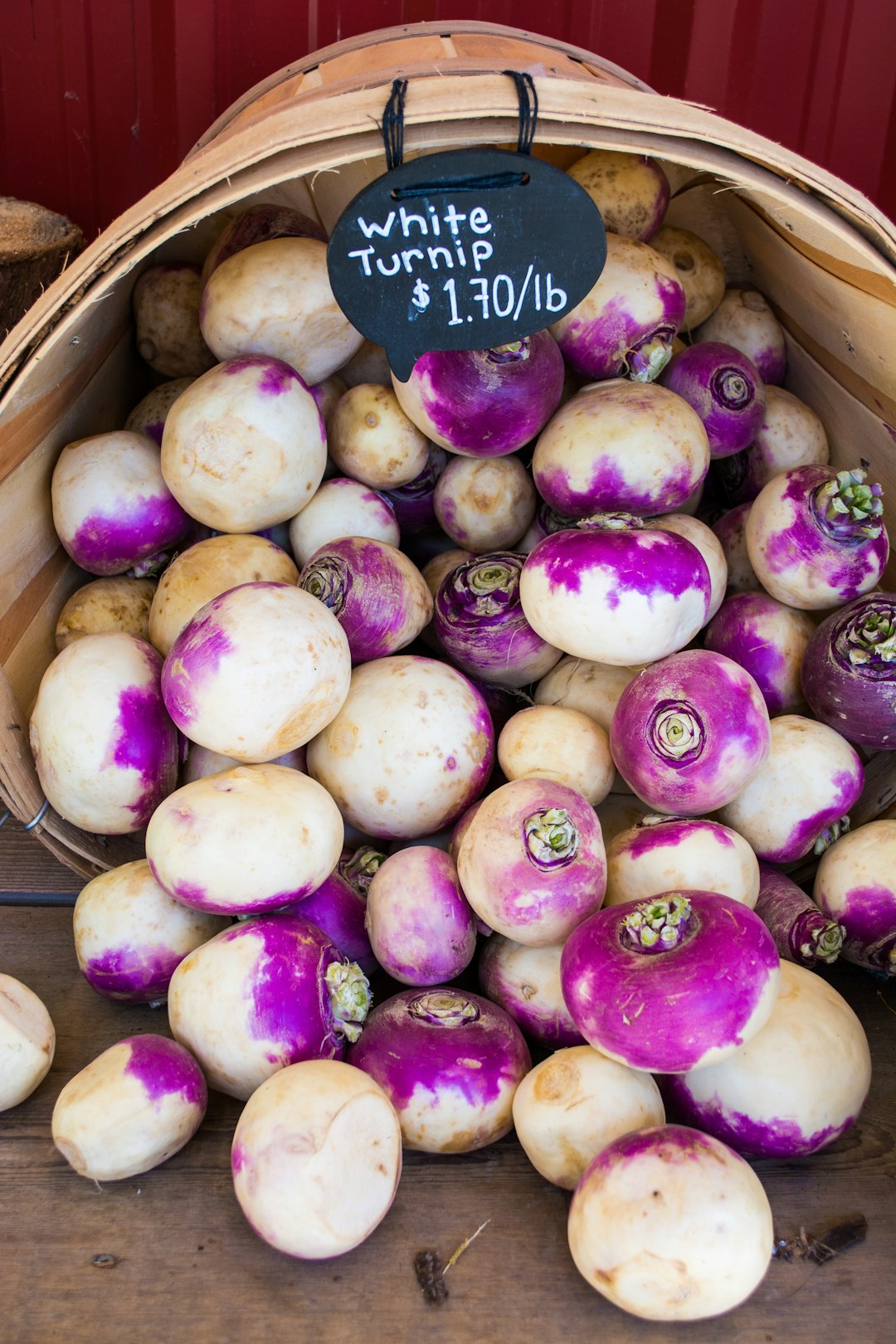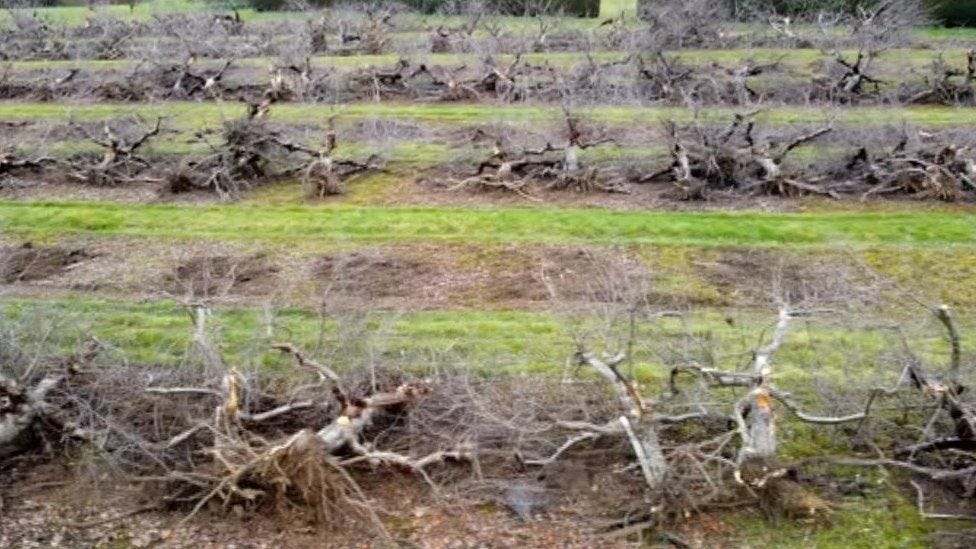Let 'em eat turnips
A recipe that isn't Thérèse Coffey's for Sautéed sliced baby turnips and tops
When supplies of tomatoes to British supermarkets disappeared recently, the UK government’s Environment Secretary Thérèse Coffey took a Marie Antoinette approach. While MA didn’t actually voice the ‘Let’em eat cake’ quotation always and erroneously attributed to her, TC did propose we should eat turnips instead.

“It’s important to make sure that we cherish the specialisms that we have in this country,” Coffey told the UK parliament. “A lot of people would be eating turnips right now rather than thinking necessarily about aspects of lettuce and tomatoes and similar.”
Unfortunately, her plea in favour of the humble, old-books-in-the-attic-flavoured root hasn’t stretched to backing its growers. Vladimir Putin appears more aware than Coffey that one of her own constituents, a leading wholesaler specialising in traditional English fruit and vegetables of the sort Coffey wants us to switch to, stopped growing turnips three months ago. The reluctance of supermarkets to pay higher prices for them to cover rising costs of energy and fertiliser, made growing them no longer worth his while. Another, in Lancashire, said he had stopped growing turnips when his electricity bill rocketed from £50,000/$60,887 to £125,000/$152,218.
Putin gleefully announced that if we followed her recommendation, as it might be to replace the tomato in a BLT with an equally satisfying slice of turnip, we’d probably have to source them from Russia.
It’s not just turnips farmers are cutting back on. Acreage to grow potatoes, leeks and brassicas has been reduced by almost 25 percent. The proportion of all produce currently grown in the UK - about 60 percent - is predicted to fall further. Andrew Burgess, chair of the National Farmers’ Union organics forum said, “Our level of self-sufficiency is going to be probably the lowest ever recorded, probably below 50 percent this year. That’s pretty scary when you think about geopolitics at the moment.”
At British branches of a budget supermarket chain, a cauliflower costs 88p/$1.07. In France, one at the same chain costs €3.50/$3.75. The British refuse to accept any changes to the pricing of food which is among the cheapest in the world. And it’s putting British farmers out of business.
Sustain is an alliance of food and farming organisations. Last year it found that farmers were making less than one penny in profit. Its director of sustainable farming said the UK’s food system was “no longer fit for purpose”.
It’s not just vegetables we’re losing. It’s fruit. Since the 1990s, 80 percent of British orchards have disappeared as unprofitable. The county of Kent is known as The Garden of England. Not for much longer. Apple farmers are grubbing up their orchards. Post Brexit, there aren’t the foreign pickers to pick them and the British won’t do it. Fruit is being left to rot on trees. Apples that do make it to a supermarket are not turning any profit. One grower, in Marsden, Kent, has scrubbed 50 acres of trees. In the future, he says, buyers will have to rely on foreign imports.
We can’t depend on our local politicians to reverse this trend. This week, Cambridgeshire County Council is voting on whether to cut down 1000 trees on one farm, to create a bus bypass that would tear through Coton Orchard. It’s not just its 520 apple, pear and plum trees. Owner Anna Gazely reports that as well as producing fruit, the orchard supports 3 pairs of foxes, 4 pairs of badgers, woodcock, 3 sorts of woodpeckers and - literally - a partridge in a pear tree.
It is challenging to maintain the belief any longer that government or councils represent the wishes of the people who voted them in. In a 2012 agreement worth £1.2 billion/$1,461,300,000, Sheffield council signed a 25-year contract to remove and replace 17,500 healthy street trees as part of works to improve sidewalks and roads.
The felling began, deliberately at night when neighbourhoods were asleep. Nevertheless, campaigners, many of whom were sent to jail, believe they managed over several years to save 10,000 of the trees, over half of them. A report has finally just been published accusing the Council of dereliction in its behaviour. Publication did not deter last week Plymouth Council, also under cover of darkness, from felling 110 neighbourhood trees. This was just one week after 105 healthy trees were razed by Northamptonshire Council before an injunction was imposed.
Britain’s councils seem to have forgotten that the carbon dioxide trees absorb as they grow and store in their wood helps slow the rate of global warming. Much as President Biden, with his eye on next year’s election and American anxiety about rising fuel costs, one day after announcing sweeping curbs on oil and gas leasing in the region authorised three drill sites in Alaska, so Britain’s shaky Conservatives need the support of every builder, contractor, and voter wanting more housing and better transport at the next election they are widely predicted to lose.
Currently awaiting Royal Assent is the Police Bill 2021. This will severely curb the right in Britain to peaceful protest and the defence of free speech. If there are any tree protests to come, they could be illegal.
If you’re one of those people who feels less uncomfortable taking a flight with an airline that promises to plant a tree for every mile you fly, to offset the carbon emissions of a return flight London-New York 78 trees will need to be planted. At the rate British local councils are chopping trees down, added to the rate British cash-strapped farmers are forced to scrub up our fruit trees, you might suppose the only solution is to take as many flights as you possibly can: if you’re thinking of replacing Sheffield’s trees, 224 flights to New York and back.
Alternatively, you might take the approach of debt-burdened Sri Lanka. When I was there recently, people approached me on the street to ask where I was from. London, I said. Thank you for coming, they responded. If you like our country, please tell your friends to come. We badly need tourist dollars. If you Google the brash question, “Is Sri Lanka politically corrupt?”, Wikipedia replies: “Corruption in Sri Lanka is considered a major problem in all levels of society, from the top echelons of political power to minor staff levels. Weak whistleblower protections undermine citizens' willingness to stand up against corruption.”
I wouldn’t dream of making a comparison. However: Hello, overseas readers of Tabled. Please come and visit the UK. We badly need your money so we can plant turnips. And trees.
Turnips, an ancient member of the mustard family dating in wild form back to 2000 BC, have a bad reputation, perhaps because they have been cooked to death when much too large and past their best. An important crop for Antebellum America, they were cultivated for their greens as much as their roots. This recipe uses both.
Serves 4-6
500g/1lb turnips (4-5) with leaves (If no turnip tops: 350g/12oz mustard greens or half-and-half kale and watercress, roughly chopped, will substitute)
1 clove garlic, cut in half
2-3 tablespoons olive oil
Salt and freshly ground black pepper
Grated zest and juice of 1 orange
Wash turnips, slice off leaves and thinly slice roots. In a large saucepan, fry the garlic in olive oil until brown, then discard. Add sliced turnips. Season and sprinkle with grated orange zest. Toss continuously for 5 minutes.
Chop leaves and add. Season and sprinkle with orange juice. Toss and cover, and steam for 1-2 minutes till leaves wilt. Remove from heat and leave covered 10 minutes to finish steaming. Excellent with roast pork or venison.
Hint: Cooks perfectly tossed in a wok.







Bran is even more manageable! Thank you. I hope our Environment Secretary will relish this recipe as much as I shall.
However delicious your recipe I am not persuaded about turnips!